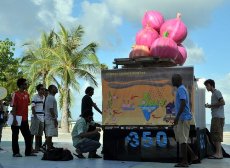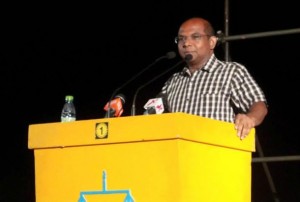The Elections Commission (EC) has this morning said that expediting the presidential polls by one week is not possible after all three candidates requested the election be moved from November 9 to November 2.
The EC has said that the commission lacks the facilities to do so in such a short period.
Speaking to the press outside the EC, Maldivian Democratic Party (MDP) candidate and former president Mohamed Nasheed said that the three candidates would nevertheless continue to discuss concluding the presidential elections by the end of the current presidential term on November 11.
Progressive Party of the Maldives (PPM) candidate Abdulla Yameen also said he had not yet given up hope.
Yameen had requested a meeting with Nasheed and the Jumhooree Party (JP) candidate Gasim Ibrahim at 10:00pm last night after the People’s Majlis passed a resolution to hand over the presidency to the Majlis Speaker – MDP MP Abdulla Shahid – in the absence of a president-elect by November 11.
The PPM and JP had boycotted the Majlis vote, but the resolution passed with the support of 39 MDP and Dhivehi Rayyithunge Party (DRP) MPs.
Speaking to the press outside Traders Hotel last night, Yameen said the three candidates had wanted an elected president to be sworn in at the end of the current presidential term on November 11.
“The most important matter we agreed on was to meet the Elections Commission tomorrow to ensure this election is transparent, credible and acceptable to all citizens. The first aspect of that is to expedite the date for the first round. If the elections [commission] can do it, to hold the election on next Saturday, [November] 2. Along with that, the second round, at the latest on November 9,” Yameen said.
He reiterated that the voter registry must be acceptable to all parties. He claimed the voter registry could be compromised as it was maintained electronically.
The candidates had asked the EC to start verification of re-registration forms immediately and to revise its work plan to hold elections by November 9.
“All of us three candidates want the election to be a fair decision by all citizens. To ensure we do not have to go to the courts again. We will not be unreasonable in this matter. Nasheed, Gasim and Yameen want this list to be accurate,” he said.
Current schedule, past record
According to EC timeline, a draft of the final voter list is to be publicized on November 1 and 2 and re-registration forms will be sent to the Department of National Registration on November 3 for verification.
The voter registry will be finalised, printed and sent to presidential candidates on November 4. Candidates will be asked to sign the voter lists on November 5 and 6.
Qasim said the three candidates will give the EC as much leeway as possible in expediting elections.
“We agreed, on November 11 an elected president must be sworn in. The three candidates [agreed] to give the Elections Commission as much leeway as possible while upholding the basic principles of the Supreme Court,” he said.
Expressing support for an election on November 2, Nasheed said he hoped two rounds of the presidential election are held before November 11.
“We spoke and agreed not to view each other with hatred, or think the other to damage the other, not to take that path, to do what we can to facilitate the development of the nation for the citizens,” Nasheed added.
The November 9 poll is the EC’s fourth attempt at holding presidential elections. The JP sought a vote annulment at the Supreme Court after narrowly placing third in the first round of presidential elections held on September 7.
With the Supreme Court verdict pending as the second round of elections approached on September 28, the EC decided to proceed with polls. However, the Supreme Court issued a midnight injunction ordering police to halt elections preparations.
Shortly afterwards, on October 7, the Supreme Court annulled the September 7 polls, citing widespread electoral fraud despite unanimous domestic and international observer praise of a free and fair electoral conduct.
The apex court ordered a revote by October 20 and delineated 16 electoral guidelines for including obtaining candidates signatures on the voter registry and obtaining police help in dispatching ballot boxes and papers to polling stations.
However, the EC was unable to proceed with polling after police forcibly halted the election at the eleventh hour following the government’s refusal to facilitate polls without the PPM and JP having approved the voter registry.
The PPM and JP have accused the EC of fraud and have called for members to resign.
In an interview with Television Maldives (TVM), EC president Fuwad Thowfeek said the EC requires at least 21 days to hold an election. Fuwad said he could not ask his staff to work like “pharaonic slaves” again.
“The Elections Commission believes it will take us 21 days to hold an election at the earliest. So if we start immediately, November 9 is the earliest date, with a shortened time frame for tasks,” he said.
 “We’ve seen incredibly creative actions in the Maldives by grassroots activists fighting climate change too and with such international concern for the political situation there, similar tactics could be employed at the current time with great effect,” he added.
“We’ve seen incredibly creative actions in the Maldives by grassroots activists fighting climate change too and with such international concern for the political situation there, similar tactics could be employed at the current time with great effect,” he added.




